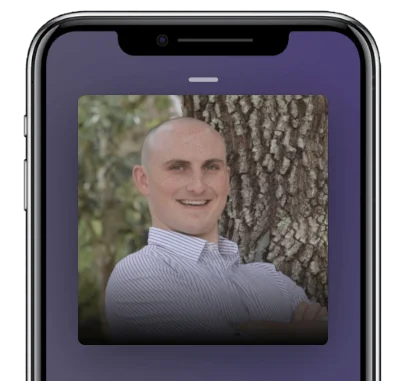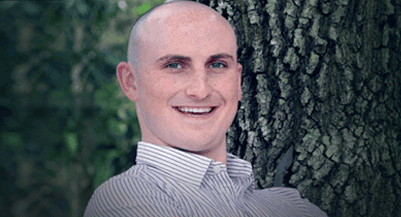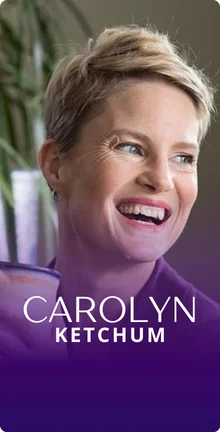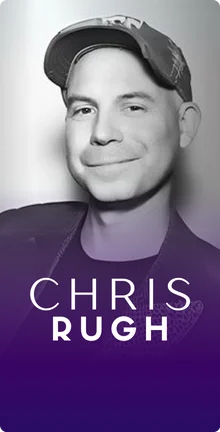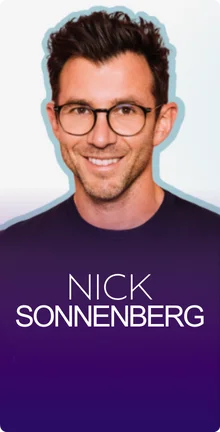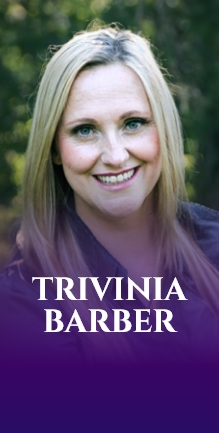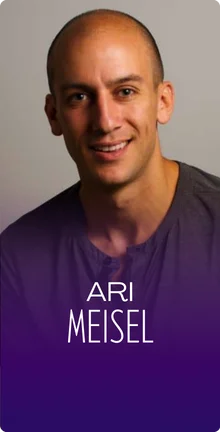It’s great to be here. Thanks so much for having me.
First of all, let’s share your story with our audience because it’s pretty cool. You are a serial entrepreneur. You’ve had some ups and downs and you’re a self-made man. I’d love for our audience to hear a bit about your journey.
Growing up, my parents were both teachers and I always had the mentality that I was going to go to college, get a real job, work for 30 years and retire. They always made me get these summer jobs, these internships. I had to pay for everything myself. I worked for errands. I worked for Firestone and I learned some incredible skills at a young age from sales to customer service to how to manage people. The one thing I realized was I hated being there every day. I hated looking at the clock and not being able to leave and not having any freedom and working for someone else and following their rules. I knew that if I ended up working for someone else at the end of the day, I was not going to be happy.
When I got to college, I started hustling. I looked at it as a ticking clock. If I didn’t figure out how to start a business, by the end of year four I was going to graduate and go into the real world and have to get a job to survive and never get out. I started buying and selling people’s textbooks. I had used summer money, the few thousand dollars I had in my bank account. At the end of every semester, I would spend that money on buying people’s books. I would hold on to them, I would store them in my car and in my dorm and at the beginning of the semester, I would sell them. I’m competing with the school bookstore, who we all know rips people off. I did that. I created a little referral program. People started talking about me. Before I knew it, I had lines out the door of people trying to sell me their books. It got to the point where I got a cease and desist letter from my school telling me to knock it off because I was taking too much of their business.
That was my first glimpse into being an entrepreneur. This was back in 2008 and Amazon was becoming more than a bookstore. I had started experimenting. I’m selling textbooks there. I would sell them in different textbook stores and all of a sudden, Amazon started making me more and more money. I noticed that you could sell other products on Amazon. I had the idea that I could sell products I didn’t have and build a relationship with someone who had them. Every time I would get the sale, they would ship it for me. It was years before I even knew that it was called drop shipping, but the concept of not having a warehouse, because I didn’t have a lot of money to buy products upfront. I didn’t have any place to store them.
I started experimenting with products that I was familiar with, the sporting equipment, DVDs and video games, typical college guy stuff and it failed over and over again. The only thing I could get to sell were these books. It wasn’t until I branched out of my comfort zone and came across the baby product industry that this business exploded. If you can imagine me as a twenty-year-old single guy selling baby products on Amazon, that was me. That was the launch of my first company. From there, I had to start paying taxes. I met with an accountant. One of the first things he asked me was, “When are you going to hire your first person?” I looked at him and said, “Why would I do that? I’m going to have to teach them. That’s money out of my pocket. I can do this seven days a week. They’re going to steal my ideas, they’re going to hurt my business.” There are these endless excuses that lots of entrepreneurs have.

He pretty much laughed at me and said, “You’re going to learn this lesson on your own.” Sure enough, my first busy season comes around and I don’t know what busy season is. During the holidays when everyone is shopping and buying lots of toys and lots of baby products and I got destroyed. I’m working twenty hours a day. My social life plummets, my grades go down and I somehow by working my butt off, get through to January. I think to myself, “I can never let this happen again. I need to start hiring.” I post a job on Facebook and sure enough, my first hire is incredible.
I barely interview him. He crushed it for me. He ends up being my business partner. I think, “Hiring is easy. You post a job on Facebook, people show up.” I proceed to make bad hire after bad hire after bad hire, quickly realizing that college kids are very unreliable and no 30-year-old expert wants to work for me. I get thrown into the remote hiring world. The Upwork, Fiverr, hiring virtual assistants, freelancers and I got pretty good at it. All of a sudden my time shifts towards from growing the business to interview after interview. I kept looking for a faster way where I could put in a request and get someone pre-vetted and ready to get started right away so it didn’t take weeks. After not being able to find it, I said, “I’m going to build this myself.” That’s when I launched the FreeeUp marketplace, a platform where we pre-vet virtual assistants, freelancers, and agencies. We let them in and make them available to people quickly with great support and a no turnover guarantee. That’s the long story of how I went from a broke college kid to starting my first and second business.
Are you still running that eCommerce business or did you sell it?
We had three partners with that. I ended up transferring that business to one of them and the other two, Connor and I, we run FreeeUp. We sold over $25 million on Amazon and we are doing over $5 million a year at one point. We got in at a great time where there were no gurus, there were no courses and we were dominating the market. We were doubling every year and it was great. After a while, we started not doubling and we weren’t going out of business, but we were staying steady. You throw in the factors of I wasn’t passionate about baby products then. I’m still not passionate about baby products now. I couldn’t see myself doing it forever. When we launched FreeeUp, it took off. It was an opportunity for me to grow my brand and help people and speak on podcasts and at conferences. It became a much more fun experience. Once it surpassed my Amazon sales, it was a no-brainer to move that over and focus all my attention on FreeeUp.
That was a pretty important moment when it surpassed the revenue that the eCommerce business was making.
With FreeeUp, we did $1 million in the first year, $5 million in the second and $9 million in the third. By year two, we were like, “We got some something.” We’d been growing way faster than the Amazon business.
Let’s talk about the problem that many of us entrepreneurs have of making bad hires and then the cost of that bad hire is pretty significant. I’ve had plenty of experiences with that and some very recent ones too. What is it that causes us to make bad hires? What’s the issue here?
Stop trying to change people and instead have them focus on their strengths. Share on XIt’s one of the most underrated skills as an entrepreneur because you go to school for economics and finance and accounting, and no one goes to school to learn how to hire people, but it is the difference between success and failure. You can have a great business idea and because you keep hiring the wrong people, you go in circles and vice versa. You can have an okay idea, but if you hire people who are great at execution, you can have a very stable ongoing business. What I learned after doing interviews for a while and perfecting my interview process is you can’t just focus on people’s skills, people’s resume, and their references.
I once took a college class on how to interview, which didn’t necessarily teach me how to do any job correctly. It just taught me how to pass interviews and so many people can do that because interviews are so focused on the skill, “What kind of experience do you have?” I can’t tell you how many times I’ve hired someone that has a great skill set and three weeks later it’s blown up in my face. I’m wondering, “How can someone that good lead to such a bad experience?” It was about the surrounding things, the attitude, and communication. When I’m looking for attitude, I want people who are passionate about what they do. They’re not just in it for the paycheck. If I hate bookkeeping and I hire a bookkeeper, they need to love bookkeeping as much as I love being an entrepreneur. We all have worked with people who are cancer and they spread to everyone around and they make everyone else miserable.
Focusing on attitude is key and lastly, is communication. I came up with fifteen pages of communication, best practices that freelancers have to memorize and get tested on before they get in our platform because I know how important it is. What I’ve found is that when you find people that have a great attitude and with great communication skills, it leads them to be more honest about what they can and cannot do on the skill side. It’s very rare that you hire someone and say, “They had a great skill set, a great attitude, a great communication but they were a terrible hire.” Usually, when you get all three of those, that’s when the best hires happen.
Attitude, skill set, and communication. With the attitude, that includes some personality attributes that they can’t change and you can’t change them. You can’t train that into somebody. If they’ve got, for example, some personality issue, defect or whatever you want to call it, you’re not going to train that out of them. It’s best to figure that out using a personality assessment. I’m big into personality assessments. Having candidates go through things like the Kolbe Test, DISC Assessment, Sally Hogshead’s Fascinate Test, StrengthsFinder, and Demartini Value Determination. These are all examples of assessments that I have candidates take. If it’s more expensive one like Kolbe, I might not have the candidate take it. I might have them take it as a new employee. DISC is free. The StrengthsFinder Assessment is only $20. I think this is a good investment to make sure you get the right attitude. What assessments or insights into people’s attitudes and personality do you utilize?
It’s funny you mentioned that. I haven’t talked about this on a podcast before. You said that you can’t change people. One of the back and forth and the biggest disagreements that Connor, my business partner, and I had back in the day was Connor was constantly trying to change people and improve them and make them people that they were not. It was intentionally good, but we realized how much time and energy we were spending trying to mold people into what we wanted instead of hiring the right type of attitude, to begin with. We finally came to a conclusion together that we’re going to stop trying to change people and we’re instead going to have them focus on their strengths. If they have a bad attitude, we have to realize that it’s going to be a huge waste of time and money to try to change that and we have to move on a little bit quicker.
In terms of personality tests, we don’t use any of the main ones. I’ve heard great things about them. We’ve defined our own questions or our own system through the first five years of the Amazon business. It’s very much the same hiring process that we use now. We have our own questions, our own interview style. One thing that we love about it is it’s constantly changing. It’s constantly evolving. When someone gets onto our platform and they become a top billing freelancer and clients love them and they’re raving about them, we go back and we say, “What did this person say? What did this person do during the interview? How can we get more people like that?” This doesn’t happen often, but if someone gets on our platform and it’s not a good fit and a few clients say something and then we remove them, we go back and we say, “How did this person get through our vetting process to begin with? How can we adjust this? Was it on the skill, the attitude of the communication side? If it’s on the attitude, which is that one-on-one interview that we do, how can we change that to avoid those type of people getting onto our platform?”
Let’s say that you’ve got somebody getting through the system, they’re not a good fit and you have this debrief afterward, you let them go or escort them off the platform. You’ve got this postmortem meeting that you have with the team of, “How did this happen?” Let’s say that during the interview process, X happened and we should have done Y instead. What’s the innovation that you have added because of these postmortem meetings?

It’s usually a question. Either we’re adding in a question or we’re changing how we’re wording a question or we have certain things that we’re looking for out of a question. It might adjust what type of answers we’re looking for. If someone gives the same type of answer, that might be something to stay away from. I don’t have anything specific off the top my head of any question. I’m not personally doing the interviews everyday, so I’m a little bit removed from that. It’s much more in line of tweaking small things now that we’re eight years into the hiring process. Although, if someone is creating their own hiring process, which I encourage everyone out there to do. We have some samples of ours that people can take, adjust and tweak. In the beginning, you’re making bigger and bigger changes or as you get deeper when you have a high success rate here and there, maybe people get through because no one has 100% hiring success rate. That’s when a lot of the smaller tweaks and changes and maybe you add a question upfront or you adjust it like I mentioned before.
I got to share one innovation that I learned and I’m going to start incorporating into our hiring process. This was during an interview with Cameron Herold on my other podcast on Marketing Speak. He talked about something called TORC and that stands for Threat of Reference Checks. Have you heard about this before?
No, but I’ve assumed what you’re going to say so I’m curious if it matches up.
What he does is he gets the names of people throughout the interview process. He’ll extract stories of like, “Tell me a time when you worked with an especially difficult boss or a difficult client or whatever, and you turned that into a win and so forth. What was that person’s name?” Jot it down. By the time the interview is done, he’s got ten different names and these are not the names of people who are on the highly curated reference list that the candidate is presenting you with. This is a different list all together that they were not planning on providing references for. At the end of it, he asks for the contact details of all ten of those people saying, “I hope you don’t mind, but I’d like to contact these people. Can you give me their contact information?” If they turn white and if they tell you that, “I provided you with my references already,” you know that that’s not a good hire. That’s somebody you should escort out the door.
If they give you eight out of ten of the contact names, then that’s probably a B player. If it’s a ten out of ten, that’s a good sign. He doesn’t even have the time to contact all these people. He essentially threatens that without it sounding like a threat. He just says, “Bill’s on the list. What would Bill say when I call him and ask him what your top strengths and top weaknesses were?” Whatever the question is. “Tell me what Bill would say about,” insert in the blank. He gets incredible insights into the candidate by doing this and he doesn’t even have to call Bill or any of the other nine people. It’s been a huge innovation in his hiring process and I’m totally going to steal that and use that in my hiring process too.
What does pre-vetting mean because you want to make sure that the person is a good fit for the role. Let’s say it’s a virtual assistant or a social media type person who’s preparing tweets and Facebook posts and that sort of stuff. You want to make sure that the person can speak in your voice, that they have attention to detail, that they are reliable and trustworthy. They’re going to have access to your social media accounts after all potentially. What does this pre-vetting mean and what kind of vetting do I still need to do even though they’re pre-vetted?
The pre-vetting comes down to the skill, the attitude, and communication. Keep in mind, we have virtual assistants in the Philippines, but we also have freelancers who are self-employed running businesses and we had agencies on our platform who are businesses too. It’s not necessarily the same thing as hiring an internal employee. We talked a little bit about the attitude and communication. I want to make a point on the skill. For skill, we’re not necessarily looking for everyone to be a ten out of ten. Just because they’re pre-vetted, it doesn’t mean that every single person is an A-plus rockstar at every single skill. You can be a seven out of ten or a five out of ten, or a three out of ten, as long as you’re priced accordingly and you’re honest about what you can and cannot do.
No one has 100% hiring success rate. Share on XWe’re very confident that the people getting through our process are honest about what projects they can take. Once they’re in, we’re very quick to remove people that take on projects that they’re experimenting with our clients where we’re not a marketplace to do that or with the bad attitude or poor communications skills. We can introduce a client to someone who is pre-vetted. What the client needs to do is make sure that they’re a good fit for them, for their business. Even the best freelancers, the best virtual assistants in the world are not the best fit for every single client out there.
Everyone has a different style. For me personally, I know myself very well. I know I talk fast. I know I’m direct. I know I move at a certain speed and I like to work with a certain type of people. If I get someone that is warm and fuzzy or someone that maybe can’t handle the way that I talk or the way that I communicated the way that I do things, they might be great for nine out of ten clients on the FreeeUp platform, but they’re not a great fit for me. That’s what I encourage clients to do is focus on them and their business and whether that candidate is ideal for them.
Is there a trial period or trial project that you recommend, whether somebody is using your platform or they’re using Upwork or any platform, even finding somebody on Craigslist? I found some great hires on Craigslist. Tell me what your process is for that.
Once we introduce the applicant to the client, it’s up to the client what they want to do. They can interview them. They can meet with them if they want to. We have clients who have used us for years and they trust us and they hire them. While we don’t necessarily recommend doing that, it’s not for us to tell the clients what to do and what not to do. In terms of what I recommend for testing, try to break down the project. You want to find out if someone’s a good hire in day one, two, three, not in week four, five, six. When I’m hiring someone, I have fifteen pages, actually, it’s more than that, but it started off as fifteen pages that they have to memorize just that first few days, first week. My team and I are there to answer any questions. We’re there to support them.
I don’t want to start investing my time and my energy into someone unless they’re going to understand what they’re reading. At the end of however long it takes and if they take an extra day, it’s no big deal. It’s either they understand it or they don’t. If they don’t, I’ll pay them for their time and part ways. If they do, then we’ll start investing in doing the one-on-one and stuff like that. If it’s more project-based, try to break it down. If you hire someone to build a twenty-page website, have them do page one and then provide them with feedback and see if they can adjust to your feedback. If they’re writing some articles, have them write a few paragraphs and give them some feedback. From there, you can understand whether someone is first of all the right fit for you. Second of all, they can adapt to your feedback because as a freelancer, they have lots of different clients who want lots of different styles. The best freelancers should be able to adjust to your style and you want to make sure that they can before you commit a lot of work to them.
It’s not about a trial period of let’s say four weeks. It’s not even about a test or trial project. It’s more test assignments and course-correct fast on the first day or two days. If they do not seem to get it, then you move on.
That’s what I recommend. Being an entrepreneur is all about time. Anything I can do to save myself time down the line, I want to do. I want to spend a little extra time up front, making sure someone is the right fit so it doesn’t cost me hours or days or weeks down the line.

You mentioned a couple of times this communication best practices, document that they have to memorize and it’s fifteen pages. Would you mind sharing a few of the best practices from that document?
I actually messed that up. We have fifteen pages of communication best practices that they have to memorize and get tested on before they get on our platform. What I was trying to refer to is let’s say I’m hiring a virtual assistant for me. I have twelve assistants that monitor my Skype, emails, and LiveChat. For that particular role, which I hired four, we have 50 pages of how that works. They have to spend the first week working on and learning before we test them. I’m tongue-tied a little bit there. In terms of communication best practices, one of the things is responding within a business day at all times, unless they gave notice otherwise. We only want to work with freelancers, virtual assistants, agencies that can respond within a business day. It’s pretty easy if someone doesn’t respond within a business day, clients can contact support and we’ll reach out to them.
These are real people. Life happens, things get lost in a spam folder. For the most part, people should be responding within a business day. If someone’s having an emergency or a family issue, they’re not just disappearing. They’re sending an update and keeping clients informed, being able to give estimates and hit due dates and establish a scope right from the beginning. Those are simple things that are important when you’re dealing with communication. There’s nothing more frustrating as an entrepreneur than having someone who’s working mid-project disappear for three days and you have no idea what’s going on.
Those are all great tips and best practices. I’m going to ask and you can say no or you can say that’s proprietary or whatever. Is that a document that maybe we could share with the audience?
We do not share that document, unfortunately. The only people that get it are the freelancers that get to that point of our interview process before they get on the platform.
If you don’t ask, you don’t get. Let’s say that somebody has come onboard. They’ve survived the trial assignments and there is a personality clash or some jealousy or issues between two team members that didn’t appear in the first several weeks. What are your suggestions for dealing with that scenario?
A lot of it comes down to how much time was invested into someone. If someone’s causing issues in week one, week two, I’m pretty quick to remove them. If I’ve invested a year into working with two different people and now they’re clashing, that’s a much bigger issue. I’m going to give it a little bit more time to resolve itself. I always start with hearing people out. I want to know where they’re coming from. I want to see are they crossing the line at all between business and personal, because I tend to not work with people long-term that can’t separate it or that, “This person doesn’t like me or this hurts my feelings.” If you can’t be in a professional environment and work together, no matter what I do, even if I fix that problem, that’s going to come up again down the line.
Step one of problem solving has always been to gather information. Share on XI’m trying to get as much information as possible. Step one of problem-solving is gather that information. From there, you start looking at solutions and see, “What have I invested into each person? How solvable is this? Am I putting a Band-Aid on it or is it a long-term fix?” You can even give solutions to them and different proposals and get their thoughts. It doesn’t mean you have to listen to them. That’s usually how I go about handling problems deciding, “Am I letting one of them go or both of them go? Am I separating them to different teams so they don’t talk to each other? How am I proceeding forward and is that even possible?”
Let’s talk about your team. You mentioned you have twelve VAs, virtual assistants. Are they all in the Philippines or are they spread out in different parts of the world? What does that team look like and what do they do?
The cool thing about FreeeUp is we have no office. We have no overhead. We only hire people from our platform, the same virtual assistants and the same freelancers that are available to our clients. All the day-to-day operations, my assistants, our billing team, stuff like that is all outsourced from the Philippines. All of our higher-level stuff, our blog, our Facebook ads, our social media channels, most of them are from the US, but scattered freelancers. They are all available to other clients as well. They all work for other clients on the platform. The day-to-day operation people, my assistants that work under me are all in the Philippines.
What are they doing these VAs in the Philippines? You read off a few different things like they’re checking your Skype messages and your email. What are their job duties and more than just a super quick list?
If you go into my marketplace model, there are three different core teams. There’s my team, which is the day-to-day operations. They’re filling tickets, they’re customer service, they‘re monitoring my Skype and emails. Then you’ve got the billing team, which our billing periods are Wednesday to Tuesday. We charge clients on Thursday. We pay our freelancers the next Thursday. There are fixed prices in there and all that. We have a team that’s handling all the billing and then we have what we call our freelance success team, which is they’re going through the applicants, deciding who gets an interview, interviewing them, onboarding them into our platform and getting them set up with an account. Then they get passed off to my team, which actually are filling the tickets and interacting with the clients.
It goes full circle to once someone hires someone, it goes to billing and you have that full triangle. All three of those triangles are handled by people in the Philippines, doing everything from the interviews, to responding to every question that gets asked via email to saying, “This charge was wrong,” whatever it was on the billing side. All that is in the Philippines. Then you’ve got the marketing, you’ve got the development, you’ve got the blog stuff on the outside of the three main cores of the business that are all those higher level freelancers.
The higher level freelancers, they may be based in the US or Canada or somewhere where they’re most likely native English speaking?

It depends. Our social media team, for example, has a graphic designer in India, a video editor in the Philippines and then a US marketer. Sometimes it’s a combination. Our blog, for example, is mostly US writers. My Instagram is run by a US agency. It’s mostly the US with some other supporting pieces scattered around. That’s also how I do it. I have plenty of clients who have their PPC done by someone outside of the US.
What’s so special about the Philippines? I happened to know because I have full-time team members that are based in the Philippines. From your perspective and your experience, what’s special about the Philippines that you don’t get with India, Bangladesh, Pakistan and some of these other countries where the staff are inexpensive and hardworking, but there are perhaps some other barriers that make it harder to work with them?
I’m always hesitant to take one group of people and throw them in a category and say all the people relate to this. As I mentioned, my graphic designer is in India and she’s great and I would put her against any graphic designer. What I found long-term hiring in the Philippines is the communication for me is better. I can get on the same page quicker. We can execute things and we can work together. For whatever reason, when I first started outsourcing, I made a base in the Philippines. Now, we get so many referrals from people in the Philippines. We’re pretty well-known there among the digital nomads or the remote workers. We probably have a bigger presence there than other places, which contributes to getting more applicants as a whole. For me, I’ve had great experiences. The communication, the culture is similar, English is their first language. I’ve worked with some incredibly hardworking people that have worked with me for seven-plus years. That’s just my personal experience.
In the Philippines, the native language is Tagalog. As they’re learning Tagalog in school, many of them were also learning English.
They learned English in school. I might have said English was their native language. I didn’t mean to say that before.
It’s a language that they’re learning earlier on than in many other countries where the native language and English are different. In the Philippines, you have a lot more skills in English than in other non-native English-speaking countries.
In terms of problem-solving or the ability to understand and grasp something, I’ve found a much greater connection there. Take my developers who are in India, for example. They are great developers. They build awesome software. I can’t speak highly enough of what they did, but when I tried to talk business and relate business to the software and put it all together, they’re always seems to be something lost in translation. It requires us to do a lot more over communicating. Whereas on the customer service side, when I’m explaining a problem, my situation, it seems like we’re much more on the same wavelength.
Don't take on projects you can't commit to, whatever it is. Share on XIf you’re looking for somebody to understand business models and the bigger picture, you might want to bring in somebody from the US for example. That’s been my experience too. Yet, it’s an incredible value for money to have team members in the Philippines. I have people in Pakistan that are doing web development for me and that works great too. It depends on who you found. You found this great graphic designer in India. I’ve had some great people in India as well, but you have to have certain standards that they need to meet. I learned this from Tony Robbins that life gives you the standards that you’re willing to tolerate. If you’re willing to tolerate lower standards, you’re going to get that in spades.
Let’s walk through some of your team members. I know that you shared on the JVMM list, which is how we got to meet, the Joint Venture Mastermind group that Dov Gordon runs. He was a guest on Marketing Speak too. You shared a lot of the internal workings of, “These are how many people I have in which locations.” It went all the way from not just VAs and billing and so forth to legal and Facebook Ads, Google Ads, developers, and video editors. It was a pretty comprehensive list and I was wondering if you’d walk our audience through that same structure. It would be quite illuminating. I’m not sure if you’re willing to share that more publicly, but it would be great if you would.
I mentioned my twelve customer service reps that are in the Philippines. I also had three VAs that do lead generation that are in the Philippines. They’re looking for podcasts, influencers, potential clients or different people, companies for us to partner with. For example, we’ll partner a lot of software companies that have the same audience. Maybe it’s eCommerce, sellers, marketing companies, whatever it is, but they do something very different. We have a lead generation team. My billing team is five VAs in the Philippines. I have a US accountant. My freelancer success team is five VAs in the Philippines that are doing interviews. We’re probably adding a sixth person there. My legal team is obviously in the US. They’re not on my team. They’re the legal counsel that I hire.
Facebook and Google Ads are done by someone in the US, although they have some supporting pieces. I mentioned a graphic designer, a video editor, and some writers. The writers we pull from our blog is a combination of about three US people consistently, three non-US people consistently, although we’re constantly getting guest posts from people either inside the platform or outside the platform. That can change a little bit. My Twitter is run by a US agency. My Instagram is run by a different US agency. My developers, I have one US person and two people from India. Graphic designer, I have one from the Philippines and one from India. My YouTube channel is run by someone in the Philippines who is a very well-known YouTuber in the Philippines. My video editors, I have two people in the Philippines. That pretty much wraps it up. I’m sure I’m missing a piece here or there, but that’s the overall outline.
All of these people, other than perhaps your lawyer and maybe your accountant, they are all on your platform. These folks that you’re using, is it possible to see on your platform who you are hiring or do I have to guess?
You don’t have to guess. We just don’t display like, “These are the people that are working with me.” If anyone wants to meet someone, I have clients all the time that are like, “Can you let me know what graphic designer you use or can you recommend someone?” I had a client who hired the same Twitter agency that I use to manage their Twitter. If anyone out there wants to meet any of those people, shoot me an email. I will say the people that do my billing and my customer service, their day-to-day is pretty full. They’re working 40-plus hours a week. If you need a one-time project or small stuff here and there and they want the extra hours, by all means, do it but you’re not going to be able to hire them full-time or anything like that. Everything else is pretty much fair game and I’m more than happy to make some introductions.
What happens if somebody poaches your very valued contributors, writers, graphic designers, and podcast audio editors? You’re like, “That sucks,” because that happens. You get poached, even if you’ve got somebody who’s dedicated full-time to you. They’re not on the platform. You found them through Craigslist or posting an ad on some other platform and then they get poached, “I’ll offer you twice the money.” I’ve had that happened and it’s awful. How do you deal with that either on your platform or outside of your platform, just in the rest of the world?

There are two things. One, you’re not allowed to drop clients on our platform. It’s against our terms of use. You’re welcome to come up with an arrangement with the client where it’s like, “Let’s come up with a six-month project and at the end of the six months, we’ll reevaluate and you can agree not to renew.” If you drop clients for getting a higher paid offer either inside the platform or outside the platform, you’re not getting any more clients. You’re banned from using FreeeUp again. It rarely happens. People know that going in. We try to prepare people by saying, “Don’t take on projects which you’re not happy with the rate. Don’t take on projects you cannot commit to.” Whatever it is and to lay out that scope. It’s real life. It happens here and there. To be honest, the turnover is very low and when it does happen to a client on our platform, we have a no turnover guarantee.
If someone quits on you for any reason, we cover replacement costs and get you a new person right away. We jump in, we see, “You need three weeks to onboard a new person again. We’ll cover the new three weeks. We’ll get you someone new and make sure that you’re taken care of.” It’s real life. We can’t make it 100% hassle-free, but we can do a pretty good job and make sure that it’s quick and as painless as possible for you. Speaking for me personally, with clients taking my freelancers, I almost look at it as it’s on me. I have to make sure that people like working with me so much that they don’t want to leave. I have yet to have that happen where someone has dropped me for another client. Some of the people are more on call for work.
Let’s say a graphic designer gets a project for our client and I have a graphic design project and my designer says, “I need an extra two days because I’m wrapping up this project for another client.” It’s no big deal. If I’m in a rush, there are plenty of other graphic designers on the platform that I can pick from but usually, it’s not an issue. I almost like to focus on what I can control. What I can control is how much I pay them, how much I reward them in terms of bonuses and raises and stuff like that, but also how I treat them. Am I asking them for feedback? Am I making sure that they like working here? Am I creating an environment where they want to stay and they want to be a part of the FreeeUp internal team? That’s a big deal. Out of all the thousands of freelancers on our platform, only a select few are there and they want to stay there. Am I creating something where, “It’s okay working for Nate, but the second I get a higher paying job, I honestly prefer that?” I focused on what I can control and I’m sure at some point it will happen where someone will drop me for an outside client on FreeeUp. It’s a part of life. It’s part of running a business.
I haven’t heard before a platform where you’re not allowed to drop clients, that that’s against the terms of service. I’m guessing it’s pretty unique. That’s not a requirement on Upwork or any of these other platforms that are essentially like Upwork, the gig economy marketplaces like Fiverr.com and all that.
I have yet to hear of another platform that does that or that it has or no turnover protection where we cover replacement costs. Keep in mind, if someone does want to drop a client, we’re not going to beat them and we’re not going to yell at them. We’re just not going to let them take on new clients, because people that are constantly dropping clients and sometimes it might be in the middle of a project. It might not even be a long-term relationship. You start building a website for someone and something comes up and you can’t finish it. We can’t have that on our platform and still provide our clients with a good experience. If you drop a client in the middle of a project like that or you drop a client in general, you’re not allowed to take new clients from the platform.
Let’s dig into some of your team and what they’re doing. I’d like to start with Twitter. You have an agency in the US that’s managing your Twitter. I have a person in the Philippines who manages my Twitter and she’s awesome. She’s full-time and nobody’s going to be able to steal her. I take good care of her and she feels well-looked after. The way it works for me and I’d like to hear what it’s like for you, but I have 140,000 Twitter followers and about 1.2 million impressions a month on Twitter. That’s my reach. I tweet roughly seven or eight times a day. I don’t look at the tweets to approve them. I don’t write any of the tweets. All of that is managed by my person in the Philippines, which might sound scary to some of our audience like, “I would never let my brand and my reputation be in the hands of somebody other than me. Especially not somebody who’s overseas,” or whatever your reasons are. Those reasons are excuses and they’re holding you back and you can’t grow. A few years ago, I had 7,800 followers on Twitter and I tweeted much less back then than I do now. My reach was minimal. It’s a different ballgame when you’re willing to trust your team members to take the reins. That’s my set up. I’d love to hear about yours and how long you’ve been working with that agency and what they’re all doing for you.
It’s such a great point and I don’t think I have the reach that you do. I also don’t have a podcast or two that you do. We’ve hired them for a few months now. I have a few thousand Twitter followers. Before, I wasn’t active on Twitter at all. At the end of the day, me being a CEO of the company, I can’t run every single social media channel. A lot of this stuff is a little bit newer. Like you do, I give them access to take it over. What I did upfront was I establish what I don’t want them to say. I’m in an industry where if you say the wrong thing about outsourcing or people in another culture or anything like that, which I would never want to do anyway, it’s a big deal and I want to make it clear what cannot be said on my social media channels.
Make sure that people like working with you so much that they don't want to leave. Share on XOnce I established what is fair game and what’s not fair game, from there, it’s on them and we’ll meet once a month or once every two months and go over a plan going forward and who we want to target. There are some strategies behind it too. I’m not sure if you’re using it to get guests, but I’ve gotten on podcasts just by tweeting out at certain people. There is a little bit strategy behind it and I am very hands-on and that’s why I hired an agency. A lot of times when people hear agency, they’re thinking, “That’s a $5,000 a month retainer.” This is a US agency that’s very affordable. It’s a few hundred dollars every month. I can always pay more and they have a bunch of different packages that would probably get me more Twitter followers. I’m sure that I’ll expand it over time, but it was a good solid way to get started in different social media channels where I don’t need to create the plan or execute it.
What strategy are they doing for you beyond keeping your Twitter stream updated? Are they coming up with the editorial calendar? Are they coming up with strategies to get you on podcasts that are unique angles that you hadn’t thought of yourself? What are they up to?
We target two industries, the eCommerce industry: the Amazon sellers, Shopify sellers, eBay and the marketing industry, which is a little bit newer for us. That’s the digital marketing agencies, the influencers, the marketing courses that are out there. For us, it’s a strategy of how do we work our way up on let’s say the tier of influencers to get higher and higher to the top, and along the way get on different podcasts. If you just go to the top ten podcasts in every industry and start pitching them, it’s usually not the best strategy. For us, it’s much more building relationships and working our way up and getting in front of more and more people in each community.
Let’s switch platforms from Twitter to YouTube. You have a YouTube channel and you have a freelancer who’s based in the Philippines. They’re also a big YouTuber and an influencer in the Philippines. What are they doing for you tactically and strategically?
This is our main focus. I’ve spent all morning filming different videos. They’ll come up with video concept ideas and I can obviously approve them or tweak them and work with them. They do a ton of keyword research, figuring out what videos will be good with what keywords, what different notes to put underneath the videos. They also do the editing for the videos and edit them in different ways. A lot of it is giving feedback and advice for me so that I can go out there and show up and make the video. That’s how I like to structure it. I’m the face of FreeeUp as of right now and I’m going to be the one showing up on the podcast and the webinars and recording different videos. They want to put me in a position to succeed like I want to do the same for them. I’m making the footage, I’m sending it over to them and they’re handling it afterward while continuing to provide me feedback on what good future footage should be.
They’re coming up with the video thumbnail images and they’re tagging the videos and coming up with the titles and all that?
It’s a two-way street. I had a good idea for a video and I ran it by them and they were like, “This is great. Let’s do it.” It’s not all coming from them to me. I’ll throw ideas to them and sometimes they say, “You probably shouldn’t do that because of X, Y, Z or that’s a great idea, do it.” Vice versa, they might say to me, “I want to do this video.” I say, “I don’t think that’s a content I want to put out there.” It’s very collaborative and that’s where a lot of people miss the boat when working with freelancers. They’re so used to that employer-employee mindset where someone’s a boss and you tell them what to do. They don’t realize when you turn everything into a collaboration where everyone’s working together for that common good, whether it’s a YouTube channel, a Twitter page, a blog or whatever it is, that’s when you can have a ton of success.

One thing I learned that was a big a-ha for me, I learned this from Trivinia Barber is that you need to delegate the outcomes, not the tasks. That was huge for me. That dovetails nicely with what you were saying about having this be collaborative. This freelancer who’s a YouTuber, how many subscribers and how many video views does this person have?
On his own channel, it’s got to be over 213,000.
That’s a pretty good number. I know in the US if you’re in the LA area, there’s this place called YouTube Space available as a free resource to YouTubers who have over 10,000 subscribers. Having 50,000 or 100,000 makes you a pretty significant celebrity in the YouTube world and you get access to all this equipment and sound stages, like video stages and all that. How did you find this person on the platform? How does this work? Do you say, “I want somebody with these skills or somebody with this reach or experience already and find me somebody?” Do you use a search function within the platform?
Normally, you would create an account and submit a request and we would introduce you to someone within a business day and then you can meet with them and make sure you like them. If you like them, you can either click hire and negotiate the rate or agree to a fixed price. If you don’t like them, you can click pass and provide us with feedback and we’ll get you someone else based on that feedback. There’s no browsing, so it saves you a lot of time. You put in a request and we fill it. This particular person, it’s funny, I ran an event in the Philippines a few years ago. I went there and he was someone we hired to videotape the event. Actually, we didn’t hire him. He had the YouTube channel. He wanted to put us on his YouTube channel. He reached out to us through some connection and he showed up. He put the thing on YouTube and it got a lot of views and it enhanced our presence in the Philippines. He also did freelancing on the side. After he met us and learned about us, he applied on the platform. When we saw that he got onto the platform, I talked to him and we hired him from there. That was an interesting story. I’m sending requests just like clients are on the platform and interviewing the people that get approved for that ticket.
I might join the platform. Are you using him full-time or does he have availability?
I’m not using him full-time. I have no idea what his availability is outside of me, but I’m happy to make an introduction.
Speaking of the platform, FreeeUp, what offer do you have for my audience? Can you give them a discount or some special deal that is not public?
When you turn everything into collaboration where everyone's working together for that common good, that's when you have a ton of success. Share on XWe’re going to do a free $25 credit for anyone that signs up and mentions this podcast. Try it out. It’s free to sign up. There’s no monthly fee, there’s no minimum, no obligation. It’s in our best interest to get you the people you like that will help you grow your business. Create a free account and get $25. Test us out. If you have any questions, my calendar‘s right at the top of the website. We also have 24/7 support.
I’ve heard you offer before that you will be available to answer people’s questions. I was impressed by that. You will get personally involved to make sure that people have an awesome experience. You don’t necessarily need to get involved, but to make yourself available in that way I thought was quite generous.
It’s one of the things people have called me crazy for since I started FreeeUp. That my calendar is still at the top of the website. I’m curious to see how long I keep it there. I have no plans to take it down and honestly, I spend very little time dealing with freelancer issues. I also have an amazing team that doesn’t require me that much either. If someone does want to meet with me, they’re more than welcome to book a call. I’m happy to talk about their business and how we can help.
What would be a couple of lessons learned that you want to share with our audience that doesn’t have anything to do with your platform but has everything to do with delegating and being more deliberate with your time and your focus?
Back in the day when I was growing this business, I had my business partner. I hired this guy, and I was pretty stressed out as a lot of us entrepreneurs are. I was answering all the emails and doing every little thing and it was keeping me up at night. No one was watching the business while I wasn’t there. I hired a manager of the day and I was like, “This is great. I’m going to teach him how to do everything.” He’s reliable. He’s worked for me for a little bit and I taught him how to do emails and customer service and list products. Finally, he was good to go. It took a few months, a lot of time, a lot of energy, but it was awesome. Right afterward, I was sleeping better at night. He could handle everything. I could leave the business for days and be totally fine. I decided to celebrate, “Let’s take a vacation.” I kid you not, on my first day of vacation when I was in middle beach, this guy quit on me. It doesn’t matter why, but the point was that it was putting all your eggs in one basket. I had realized that I had done that. It was a huge lesson for me as a young entrepreneur. It was a big-time waster of how much time I put into him.
When I got back, I became so focused on delegating and diversify and departmentalizing. I’m making sure, “One person for customer service, one person for billing, one person for access and making sure the teams are separate.” I laid out, “I’ve got four assistants in this team and five assistants in this team,” or whatever it is. Anytime someone leaves, it sucks but it’s also not the end of the world. I can quickly replace someone in that team. There was a training process for that team and that was a huge lesson that I learned it. I’m so happy that I learned that in year one and two, rather than in year six, seven or eight.
This is another tip from Ari Meisel. He was also a guest on the show. He talked about how to onboard and train people. If you’re going to do a Skype or video type of training, you’re probably going to record that call. Hopefully, you were thinking of doing that already but then take that video recording, don’t just put it in a library of videos that future team members can access who are in the same role, but also have a checklist created out of that video. Make sure that the person who created the checklist from the video is not the same person who’s then going to use the checklist to look for gaps or things that aren’t clear. The person who turned that video into a checklist is going to miss that. They’re like, “That’s right. That was in the video.” They’re not going to notice that something is missing from the checklist. Somebody who’s only seen the checklist and not seeing the video, this is going to reveal some holes. That was pretty awesome. Do you have any related tips around training and creating libraries of training or creating checklists or standard operating procedures or anything like that?

I’ve found that I keep everything in writing. I only use documents. The only time that I’ll make videos, I’m at the point now where my assistants will make the videos, not me, it’s for smaller things that are set in stone. What I found running a startup is things are always changing. I’m always trying to make processes bigger and better and simpler. When I create a video, it’s a matter of time until it becomes outdated. Whereas if I make a document, it’s very easy to go in and change a few things and update it. That’s my personal opinion. I’ve had a lot of success with documents. I’m also a huge fan of keeping things in writing when you’re dealing with international people. I feel like things get lost on a call or on a video that is much clearer in writing.
We are at the end of our interview here. If you wanted to share the URL for FreeeUp, I know it’s a little counter-intuitive how you spell it. Also, if somebody wanted to follow you or connect with you directly, share that as well.
If you go to FreeeUp.com, my calendar‘s right at the top. You can create a free account. You can check out the FreeeUp blog and the FreeeUp YouTube channel. We have a Facebook group, you can join as well. I look forward to working with a lot of you. Don’t forget to mention this podcast for a free $25 credit.
What’s your Twitter for people to follow you?
My Twitter and Instagram is @RealNateHirsch.
Thank you, Nathan. Thank you for our audience. Take some action and delegate and get some stuff off your plate and then you can focus on the things that matter. I’ll catch you on the next episode of Get Yourself Optimized.

